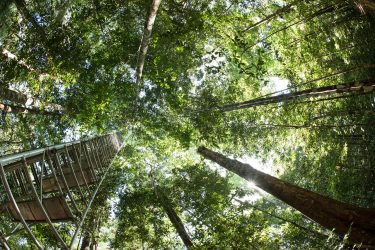
Scientists have observed that when carbon dioxide levels in the atmosphere increase, plants’ leaves thicken. Since human activity is raising atmospheric carbon dioxide levels, thick-leafed plants are likely to be in our future. The consequences of this physiological response go further — two University of Washington scientists have discovered that plants with thicker leaves may exacerbate the effects of climate change because they would be less efficient in sequestering carbon; something climate change models have not taken into consideration.
In a paper published online Oct. 1 by the journal Global Biogeochemical Cycles, the researchers report that, when they incorporated this information into global climate models under the high atmospheric carbon dioxide levels expected later this century, the global “carbon sink” contributed by plants was less productive — leaving about 5.8 extra petagrams, or 6.39 million tons, of carbon in the atmosphere per year. Those levels are similar to the amount of carbon released into the atmosphere each year due to human-generated fossil fuel emissions — 8 petagrams, or 8.8 million tons.
“Plants are flexible and respond to different environmental conditions,” said senior author Abigail Swann, a UW assistant professor of atmospheric sciences and biology. “But until now, no one had tried to quantify how this type of response to climate change will alter the impact that plants have on our planet.”
Read more at UW Today »
